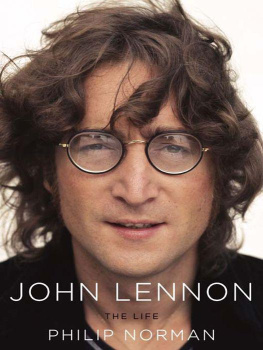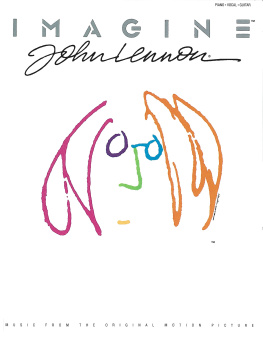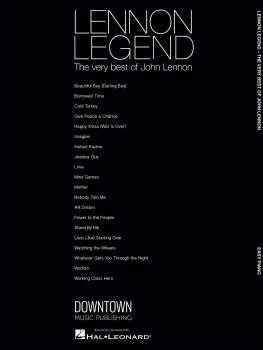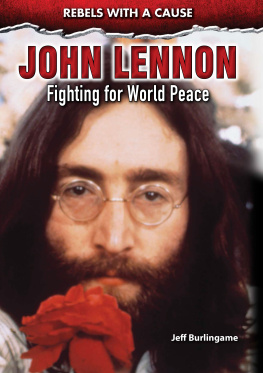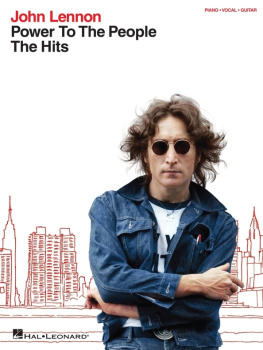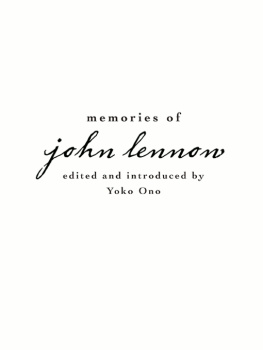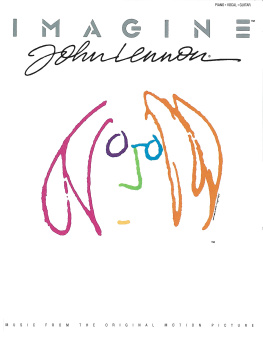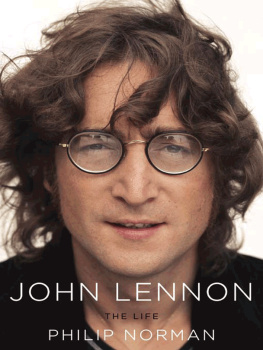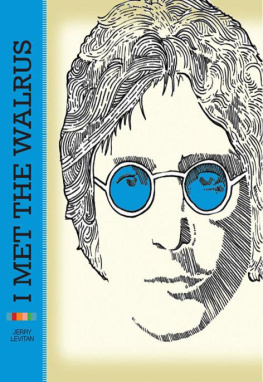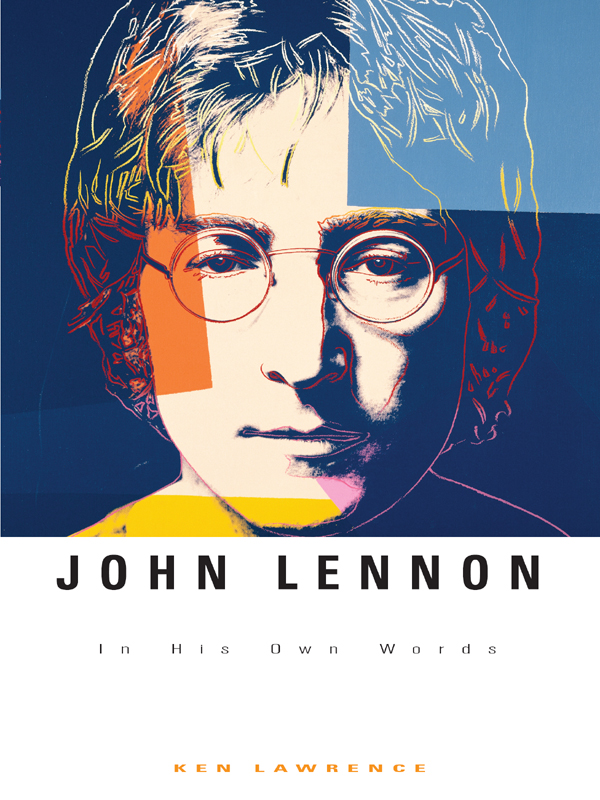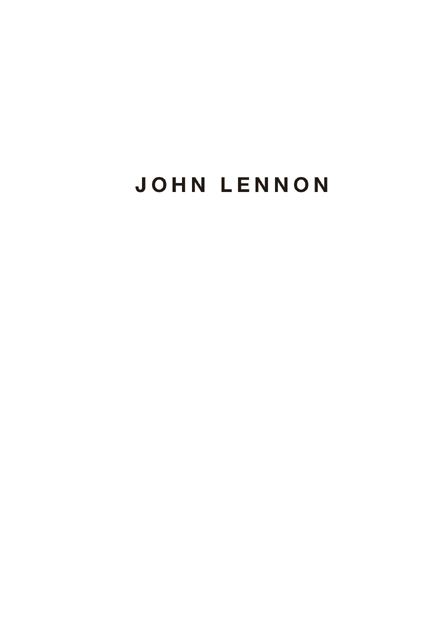
Other Books by Ken Lawrence
The World According to Michael Moore
The World According to Trump
The World According to Oprah
The World According to Bill OReilly
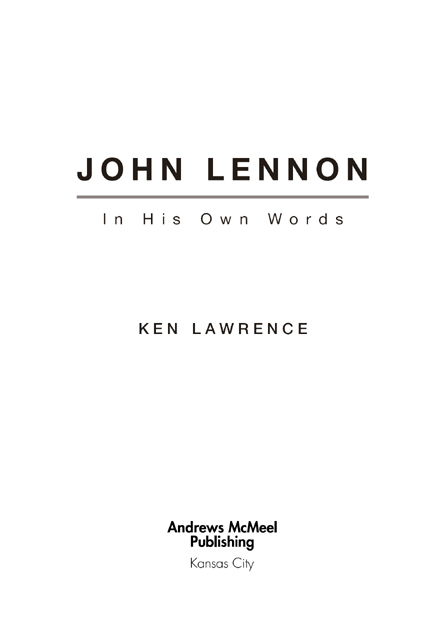
John Lennon copyright 2005 by Ken Lawrence. All rights reserved. No part of this book may be used or reproduced in any manner whatsoever without written permission except in the case of reprints in the context of reviews. For information, write Andrews McMeel Publishing, an Andrews McMeel Universal company, 1130 Walnut St., Kansas City, Missouri 64106.
E-ISBN: 978-0-7407-9312-7
Library of Congress Cataloging-in-Publication Data
www.andrewsmcmeel.com
Lawrence, Ken.
John Lennon : in his own words / Ken Lawrence
p. cm.
1. Lennon, John, 1940-1980. 2. Rock musicians-England
Biography. I. Title.
ML420.L38L33 2005
782.42166092dc22
[B]
2005047834
Design by Kelly & Company, Lees Summit, Missouri
Jacket design by Tim Lynch
Cover image provided by The Andy Warhol Foundation for the Visual Arts/Corbis
APPR
ATTENTION: SCHOOLS AND BUSINESSES
Andrews McMeel books are available at quantity discounts with bulk purchase for educational, business, or sales promotional use. For information, please write to: Special Sales Department, Andrews McMeel Publishing, 1130 Walnut St., Kansas City, Missouri 64106.
Contents
INTRODUCTION
In 1994 when the Rock and Roll Hall of Fame and Museum inducted John Lennon, they summed up his musical contribution this way: John Lennon didnt invent rock and roll, nor did he embody it as toweringly as figures like Elvis Presley and Little Richard, but he did more than anyone else to shake it up, move it forward, and instill it with a conscience.
The museums assessment was on the mark. As part of the Beatles, one of the worlds most popular pop acts, Lennon helped shape the music scene for decades to come. Although the band sometimes was savaged by critics who considered the Beatles to be too pop, syrupy in their love songs, and pandering to the mass audience, their fans did not care. The more the group was panned by the establishment, especially for their outlandish (for its time) long hair and clothes, the more their audience grew.
The group survived when others faded away because their music changed overtime, offering ever more intriguing, thought-provoking, and complex songs. Lennon led the way on these new sounds that expanded still further when the Beatles disbanded.
As a solo artist, Lennon created music that was often socially disturbing, introspective, and even spiritual, yet it advocated a positive, hopeful vision for the futureone not always shared by other musicians during the social and cultural turmoil of the sixties and seventies. His lyrics often represented the personal turbulence he had experienced in his youth. Born October 9, 1940, Lennon was given the middle name Winston after Englands Prime Minster Winston Churchill. When his parents separated, the five-year-old boy went to live with his aunt Mimi in the Liverpool suburb of Woolton. She bought him his first guitar when he was sixteen. That same year, Lennon formed a rock band, the Quarrymen, which eventually evolved into the Beatles. He was the principal singer, but he shared those duties with Paul McCartney. Even though McCartney was more pop-oriented and Lennon wrote the cutting-edge and alternative songs, the two shared songwriting credits.
Lennon had married art school classmate Cynthia Powell after she had become pregnant. They had a son, Julian, in 1963, shortly after the Beatles formed, but the marriage appeared doomed from the beginning. Their union finally broke apart when Lennon began openly dating artist Yoko Ono. The couple officially divorced in 1968 with Lennon abandoning his sona rift that was never truly healed, according to Julian, a musician in his own right.
While his personal life was unsettled, Lennons professional life was stellar, starting with the Beatles debut in Hamburg, West Germany, in 1960. So pivotal was this performance in launching the group that Lennon later commented: I grew up in Hamburg. Back in England, the group signed Brian Epstein as their manager, and a record deal followed with George Martin as their producer.
When the Beatles began touring the world, Lennon became known as the outspoken member of the group, often the joker. Arriving in a city for a string of concerts, they gave short news conferences that were carried by TV and radio stations worldwide. Lennon was always quick with a wise-guy crack, often sarcastic and cynical about all the attention. This casual reaction to fame only spurred the groups following of ardent loyal fans.
Lennon moved beyond music, however, and published his first book, In His Own Write, which became an instant bestseller in March 1964. That same year, the Beatles starred in their first movie, A Hard Days Night, and a year later Lennon wrote the title song, Help! for their movie of the same name. This song was an important touchpoint in Lennons life as he later noted: I didnt realize it at the timeI just wrote the song because I was commissioned to write it for the moviebut later I knew, really I was crying out for help. The whole Beatle thing was just beyond comprehension. I was eating and drinking like a pig, and I was fat as a pig, dissatisfied with myself, and subconsciously I was crying for help.
Despite his dissatisfaction, the Beatles juggernaut continued on with number-one hits and sold out concerts worldwide, including one in front of 60,000 fans at New Yorks Shea Stadium in August 1965. They even received the prestigious honor of becoming Members of the Order of the British Empire in 1965. Lennon returned the medal to the queen several years later as part of a political protest.
Lennon often was the center of controversy, some self-constructed and some inadvertent. In 1965, Londons Evening Standard published an interview with him in which he stated: Were more popular than Jesus now. The remarks were taken out of contextLennon actually meant that there were many millions more people in the world than at Jesuss time and because of television, newspapers, and radio, more people knew of the Beatles than Jesus. No matter. The remarks provoked protests in the United States on the eve of the groups 1966 tour. Radio stations refused to play their songs; the Ku Klux Klan and others burned their records and books. The protests did not affect concert attendance, and the group was as popular as ever. Lennon spent months clarifying his comments, and the Vatican accepted his apology.
Later that year, Lennon played Private Gripwood in Richard Lesters film How I Won the War. The movie marked his first appearance away from the group, and speculation began to circulate that the Beatles were coming apart. Although this was true, in 1967 the group released Sgt. Peppers Lonely Hearts Club Band, one of its most innovative and well-received albums.
Although he was still married to Cynthia, Lennon was openly living with Yoko Ono, and they joined together for an art exhibit in London. He began to experiment with LSD and other drugs as he pulled away from the Beatles toward a new life with Ono. Many fans became angry with Ono, blaming her for discord among the Beatles. The group denied it at the time, but later it turned out to be a major factor in the breakup.


